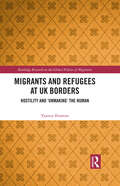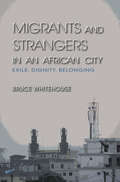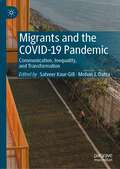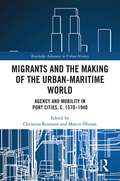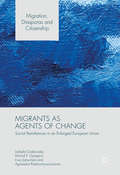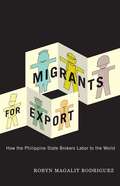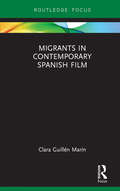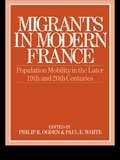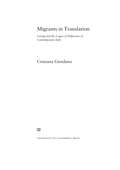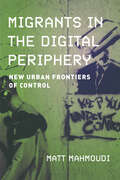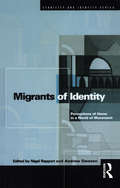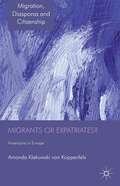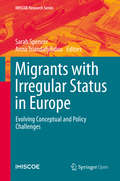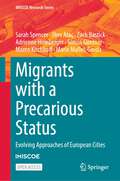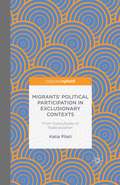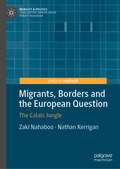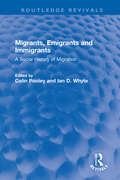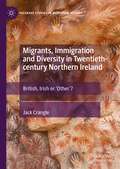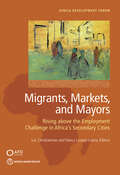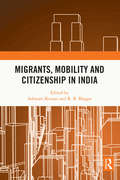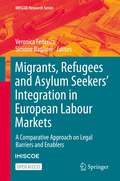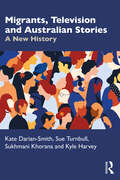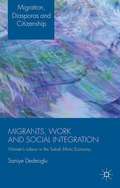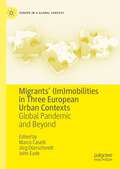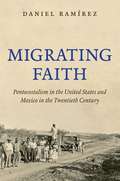- Table View
- List View
Migrants and Refugees at UK Borders: Hostility and ‘Unmaking’ the Human
by Yasmin IbrahimThis book investigates the hostile environment and politics of visceral and racial denigration which have characterised responses to refugees and migrants within the UK and Europe in recent years. The European ‘migrant crisis’ from 2015 onwards has been characterised by an extremely intimidating atmosphere which denies the basic humanity of refugees and migrants. Deep rooted in Western Enlightenment trajectory, this racially-driven politics is linked to the Western theories of scientific superiority which went on to become the basis of eugenics and coloniality as part of modernity. Focusing on the ‘migrant crisis’, Brexit, and the impacts of the global pandemic, this book unpicks the waves of crises and neuroses about the ‘Other’ in Europe and the UK. The chapters analyse the rhetoric of camps, refrigerated death lorries, the notion of channel crossings and ‘accidental’ drownings, the formation of relationship with border architecture such as the razor wire, and corporeal resistance in detention centres through hunger strike. In examining such specific sites of rhetorical articulation, policy formation, social imagination, and its incumbent visuality, the chapters deconstruct the intersection of dominant ideologies, power, knowledge paradigms (including the media) as part of the public sphere and their combined re-mediation of the dispossessed humans in the shores and borders of Europe. This important interdisciplinary volume will be of interest to researchers of migration, humanitarianism, geography, global development, sociology and communication studies.
Migrants and Strangers in an African City
by Bruce WhitehouseIn cities throughout Africa, local inhabitants live alongside large populations of "strangers." Bruce Whitehouse explores the condition of strangerhood for residents who have come from the West African Sahel to settle in Brazzaville, Congo. Whitehouse considers how these migrants live simultaneously inside and outside of Congolese society as merchants, as Muslims in a predominantly non-Muslim society, and as parents seeking to instill in their children the customs of their communities of origin. Migrants and Strangers in an African City challenges Pan-Africanist ideas of transnationalism and diaspora in today's globalized world.
Migrants and the COVID-19 Pandemic: Communication, Inequality, and Transformation
by Mohan J. Dutta Satveer Kaur-GillThis book looks at the impact of the COVID-19 pandemic on migrants globally who bear disproportionate burdens of health disparities. Centering the voices of migrants as anchors for theorizing health, the chapters adopt an array of decolonizing and interventionist methodologies that offer conceptual communicative resources for re-organizing economics, politics, culture, and society in logics of care. Each chapter focuses on the health of migrants during the pandemic, highlighting the role of communication in amplifying and solving the health crisis experienced by migrants. The chapters draw together various communicative resources and practices tied to migrant negotiations of precarity and exclusion. Health is situated amidst the forces of authoritarianism, disinformation, hate, and exploitation targeting migrant bodies. The book builds a narrative archive witnessing this fundamental geopolitical rupture in the 21st century, documenting the violence built into the zeitgeist of labor exploitation amidst neoliberal transformations, situating health with the extractive and exploitative forms of organizing migrant labor. The book is essential reading for advanced undergraduate or graduate courses for scholars studying critical and global health, development, and participatory communication, migration, globalization, international and intercultural communication interested in the questions of precarity and marginality of health during pandemics.
Migrants and the Making of the Urban-Maritime World: Agency and Mobility in Port Cities, c. 1570–1940 (Routledge Advances in Urban History)
by Christina ReimannThis volume explores the mutually transformative relations between migrants and port cities. Throughout the ages of sail and steam, port cities served as nodes of long-distance transmissions and exchanges. Commercial goods, people, animals, seeds, bacteria and viruses; technological and scientific knowledge and fashions all arrived in, and moved through, these microcosms of the global. Migrants made vital contributions to the construction of the urban-maritime world in terms of the built environment, the particular sociocultural milieu, and contemporary representations of these spaces. Port cities, in turn, conditioned the lives of these mobile people, be they seafarers, traders, passers-through, or people in search of a new home. By focusing on migrants—their actions and how they were acted upon—the authors seek to capture the contradictions and complexities that characterized port cities: mobility and immobility, acceptance and rejection, nationalism and cosmopolitanism, diversity and homogeneity, segregation and interaction. The book offers a wide geographical perspective, covering port cities on three continents. Its chapters deal with agency in a widened sense, considering the activities of individuals and collectives as well as the decisive impact of sailing and steamboats, trains, the built environment, goods or microbes in shaping urban-maritime spaces.
Migrants as Agents of Change
by Izabela Grabowska Michał P. Garapich Ewa Jaźwińska Agnieszka RadziwinowiczównaThis book offers a unique and innovative way of looking at the paradoxical consequences of human mobility. Based on a three-year transnational multi-sited longitudinal research project, it demonstrates that not all migrants acquire, transfer and implement social remittances in the same way. Whilst the circulation of ideas, norms and practices is an important aspect of modernity, acts of resistance, imitation and innovation mean that whilst some migrants become ordinary agents of social change in their local microcosms, others may contest that change. By putting this individual agency centre stage, the authors trace how social remittances are evolving, and the ambiguous impact that they have on society. This thought-provoking work will appeal to students and scholars of sociology, geography and anthropology.
Migrants for Export
by Robyn Magalit RodriguezMigrant workers from the Philippines are ubiquitous to global capitalism, with nearly 10 percent of the population employed in almost two hundred countries. In a visit to the United States in 2003, Philippine president Gloria Macapagal Arroyo even referred to herself as not only the head of state but also "the CEO of a global Philippine enterprise of eight million Filipinos who live and work abroad. " Robyn Magalit Rodriguez investigates how and why the Philippine government transformed itself into what she calls a labor brokerage state, which actively prepares, mobilizes, and regulates its citizens for migrant work abroad. Filipino men and women fill a range of jobs around the globe, including domestic work, construction, and engineering, and they have even worked in the Middle East to support U. S. military operations. At the same time, the state redefines nationalism to normalize its citizens to migration while fostering their ties to the Philippines. Those who leave the country to work and send their wages to their families at home are treated as new national heroes. Drawing on ethnographic research of the Philippine government's migration bureaucracy, interviews, and archival work, Rodriguez presents a new analysis of neoliberal globalization and its consequences for nation-state formation.
Migrants in Contemporary Spanish Film (Routledge Focus on Film Studies)
by Clara Guillén MarínDuring the last two decades Spain has undergone an unprecedented transformation from being a country of emigrants to receiving a significant number of migrants from all around the world. This book focuses on the analysis of documentaries and fiction films representing migrants in Spain in the first decade of the twenty-first century. Guillén Marín explores the ways in which migrant and non-migrant filmmakers reframe the urban and rural space to create opportunities for a free, although contested, exchange between marginal voices and mainstream Spanish society. She analyzes the extent to which the films challenge forms of exclusion and represent ethnicity in a space that includes some and excludes others.
Migrants in Modern France
by Philip E. Ogden Paul E. WhiteA discussion of the structure and role of migration flows affecting France from 1850 to the present day. It covers both internal and international movements and consideration is given both to broad macro-scale analysis and more detailed micro-scale investigations.
Migrants in Translation
by Cristiana GiordanoMigrants in Translation is an ethnographic reflection on foreign migration, mental health, and cultural translation in Italy. Its larger context is Europe and the rapid shifts in cultural and political identities that are negotiated between cultural affinity and a multicultural, multiracial Europe. The issue of migration and cultural difference figures as central in the process of forming diverse yet unified European identities. In this context, legal and illegal foreigners--mostly from Eastern Europe and Northern and Sub-Saharan Africa--are often portrayed as a threat to national and supranational identities, security, cultural foundations, and religious values. This book addresses the legal, therapeutic, and moral techniques of recognition and cultural translation that emerge in response to these social uncertainties. In particular, Migrants in Translation focuses on Italian ethno-psychiatry as an emerging technique that provides culturally appropriate therapeutic services exclusively to migrants, political refugees, and victims of torture and trafficking. Cristiana Giordano argues that ethno-psychiatry's focus on cultural identifications as therapeutic--inasmuch as it complies with current political desires for diversity and multiculturalism--also provides a radical critique of psychiatric, legal, and moral categories of inclusion, and allows for a rethinking of the politics of recognition.
Migrants in the Digital Periphery: New Urban Frontiers of Control
by Matt MahmoudiAs the fortification of Europe's borders and its hostile immigration terrain has taken shape, so too have the biometric and digital surveillance industries. And when US Immigration Customs Enforcement aggressively reinforced its program of raids, detention, and family separation, it was powered by Silicon Valley corporations. In cities of refuge, where communities on the move once lived in anonymity and proximity to familial and diaspora networks, the possibility for escape is diminishing. As cities rely increasingly on tech companies to develop digital urban infrastructures for accessing information, identification, services, and socioeconomic life at large, they also invite the border to encroach further on migrant communities, networks, and bodies. In this book, Matt Mahmoudi unveils how the unsettling convergence of Silicon Valley logics, austere and xenophobic migration management practices, and racial capitalism has allowed tech companies to close in on the final frontiers of fugitivity—and suggests how we might counteract their machines through our own refusal.
Migrants of Identity: Perceptions of 'Home' in a World of Movement (Ethnicity And Identity Ser.)
by Nigel RapportGlobal movement is commonly characterized as one of the quintessential experiences of our age. Market forces, territorial conflicts and environmental changes uproot an increasing number of people, while mass communication, travel, tourism, and a global market of commodities, texts, tastes, fashions and ideologies place individuals more than ever in a global arena. As traditional conceptions of individuals as members of stationary, fixed and separate societies and cultures no longer convince, to what extent does movement become central to individuals' self-conceptions? How do people cultivate, negotiate, nurture and maintain an identity? To what extent do individuals become ‘migrants of identity' whose home is movement?Defining ‘home' as ‘where one best knows oneself', this pioneering book explores the various ways in which people perceive themselves to be ‘at home' in today's world. Through a series of case studies, authors show that for a world of travellers, labour migrants, exiles and commuters, ‘home' comes to be found in behavioural routines and techniques, in styles of dress and address, in memories, myths and stories, in jokes and opinions. In short, people who live their lives in movement make sense of their lives as movement.
Migrants or Expatriates?
by Amanda Klekowski von KoppenfelsThis book examines the migration, integration and transnational activity of overseas Americans - American migrants - in France, Germany and the UK. It examines the reasons for their migration, introduces the concept of 'accidental migrant' and explores the question of overseas Americans' integration and identity formation.
Migrants with Irregular Status in Europe: Evolving Conceptual and Policy Challenges (IMISCOE Research Series)
by Anna Triandafyllidou Sarah SpencerThis open access book explores the conceptual challenges posed by the presence of migrants with irregular immigration status in Europe and the evolving policy responses at European, national and municipal level. It addresses the conceptual and policy issues raised, post-entry, by this particular section of the migrant population. Drawing on evidence from different parts of Europe, the book takes the reader through philosophical and ethical dilemmas, legal and sociological analysis to questions of public policy and governance before addressing the concrete ways in which those questions are posed in current policy agendas from the international to the local level. As such this book is a valuable read to researchers, practitioners and policy makers as well as to students working on irregular migration in Europe in a comparative and/or country based perspective.
Migrants with a Precarious Status: Evolving Approaches of European Cities (IMISCOE Research Series)
by Sarah Spencer Simon Güntner Ilker Ataç Zach Bastick Adrienne Homberger Maren Kirchhoff Marie Mallet-GarciaThis open access book is an exploration of city responses to migrants with a precarious status in Europe. It provides new evidence and analysis from research on three cities in Austria, Germany and the UK: Vienna, Frankfurt and Cardiff. The book explores strategies and services of municipal authorities towards precarious migrants and their cooperation with non-governmental organisations (NGOs) in service provision. It focuses on healthcare, education, housing and access to advice; and particular attention is given to the situation of women.The book develops the concept of precarity in relation to migration status, and of horizontal governance arrangements within municipal authorities. It explores the tension between exclusion and inclusion of migrants who have limited rights of access to welfare services, and contributes evidence on the factors shaping municipal policy making, as well as on the framing of rationales for providing access to essential services.
Migrants' Participation in Exclusionary Contexts: From Subcultures to Radicalization
by K. PilatiThis insightful book analyzes the political engagement and marginalization of three of Milan's migrant groups, Filipinos, Egyptians and Ecuadorians. Bringing together data relating to the civic and political engagement of individual migrants, and of migrant organizational networks, the result is an examination of the consequences of the political exclusion of migrants, exploring the different ways in which they cope with this predicament. Such exclusion, the author argues, has three major impacts. It can transform migrant groups into political subcultures and engender externally-driven participation, but it can also lead to radicalization.
Migrants, Borders and the European Question: The Calais Jungle (Mobility & Politics)
by Zaki Nahaboo Nathan KerriganThis book examines how the Calais Jungle posed and addressed the European Question. The issue of who and what counts as European was articulated through this makeshift camp. The book argues that the Jungle acquired meaning as a localised struggle to define territory, borders, rights and refugees in Europe. Henri Lefebvre’s spatial triad is used as a framing device for analysis. Discourses of tropicality are shown to produce the Jungle in terms of a postcolonial space of exception. This representational space fused bodies and environment in racialised ways. Attention is then drawn to assemblages that gave rise to political subjectivity, which partially elided a Eurocentric prism of rights. Here, the book explores how a ‘right to the jungle’ was generated via relations between refugees, aid workers and material objects—constituting the Jungle as a space of representation. Finally, intimate life in, and beyond, the Jungle is examined as a spatial practice that contests the EU border regime.
Migrants, Emigrants and Immigrants: A Social History of Migration (Routledge Revivals)
by Colin G. Pooley Ian D. WhyteOriginally published in 1991, this book covers an usually long time – from the 17th to the 20th Century – and considers the impact of internal migration and immigration (primarily in Britain) as well as emigration to North America, South Africa, New Zealand and Australia. Population movements are now recognized to be an integral part of structural change within society and this book brings together a variety of approaches. Drawing on the findings of historians, geographers and sociologists, the essays highlight areas of concern and illustrate some of the directions research on migration was taking in the early 1990s.
Migrants, Immigration and Diversity in Twentieth-century Northern Ireland: British, Irish or 'Other’? (Palgrave Studies in Migration History)
by Jack CrangleAddressing questions about what it means to be ‘British’ or ‘Irish’ in the twenty-first century, this book focuses its attention on twentieth-century Northern Ireland and demonstrates how the fragmented and disparate nature of national identity shaped and continues to shape responses to social issues such as immigration. Immigrants moved to Northern Ireland in their thousands during the twentieth century, continuing to do so even during three decades of the Troubles, a violent and bloody conflict that cost over 3,600 lives. Foregrounding the everyday lived experiences of settlers in this region, this ground-breaking book comparatively examines the perspectives of Italian, Indian, Chinese and Vietnamese migrants in Northern Ireland, outlining the specific challenges of migrating to this small, intensely divided part of the UK. The book explores whether it was possible for migrants and minorities to remain ‘neutral’ within an intensely politicised society and how internal divisions affected the identity and belonging of later generations. An analysis of diversity and immigration within this divided society enhances our understanding of the forces that can shape conceptions of national insiders and outsiders - not just in the UK and Ireland - but across the world. It provokes and addresses a range of questions about how conceptions of nationality, race, culture and ethnicity have intersected to shape attitudes towards migrants. In doing so, the book invites scholars to embrace a more diverse, ‘four-nation’ approach to UK immigration studies, making it an essential read for all those interested in the history of migration in the UK.
Migrants, Markets, and Mayors: Rising above the Employment Challenge in Africa's Secondary Cities (Africa Development Forum)
by Luc Christiaensen and Nancy Lozano-GraciaResearch on migration and urban development in Africa has primarily focused on larger cities and rural-to-urban migration. However, 97 percent of Africa’s urban centers have fewer than 300,000 inhabitants, and a sizable share of urban migrants come from other urban areas. A more holistic and dynamic perspective, incorporating migration flows along the full urban hierarchy, as well as urban-urban migrants, is needed to better understand and leverage migration for urban development. Migrants, Markets, and Mayors: Rising above the Employment Challenge in Africa’s Secondary Cities draws on demographic data, research literature, key informant interviews, and empirical research to better understand how migrants in Africa’s secondary cities fare in urban labor markets, how they affect aggregate urban productivity, and how mayors can leverage migrants’ potential to the benefit of all. It explores these questions across countries and four urban case settings: Jijiga in Ethiopia, Jinja in Uganda, and Jendouba and Kairouan in Tunisia. Although mayors in secondary cities often see migrants as a burden to their cities’ labor markets and a threat to development, the report finds that migrants contribute increasingly less to urban population growth and that they usually strengthen the resident labor force. The report also finds that labor market outcomes for migrants are at least as good as those for nonmigrants. Africa’s secondary cities are well placed to leverage migration, but evidence-based policies are needed to manage the growth and development of land and labor markets. The report reviews policy options that mayors can take to strengthen the financial, technical, and planning capacity of secondary cities and better leverage migration to benefit migrants and nonmigrants alike. ----------- "Much of the literature on migration to cities examines migration in a nonspatial fashion or focuses on rural-urban migration to the largest, most visible cities. This volume fills a gap by focusing on migration to secondary cities, coming up with a compelling set of facts. Overall, the volume is very well done and sets a benchmark for future research." †“ J. Vernon Henderson, School Professor of Economic Geography, London School of Economics
Migrants, Mobility and Citizenship in India
by Ashwani Kumar R. B. BhagatThis book reconceptualizes migration studies in India and brings back the idea of citizenship to the center of the contested relationship between the state and internal migrants in the country. It interrogates the multiple vulnerabilities of disenfranchised internal migrants as evidenced in the mass exodus of migrants during the COVID-19 crisis. Challenging dominant economic and demographic theories of mobility and relying on a wide range of innovative heterodox methodologies, this volume points to the possibility of reimagining migrants as ‘citizens’. The volume discusses various facets of internal migration such as the roles of gender, ethnicity, caste, electoral participation of the internal migrants, livelihood diversification, struggle for settlement, and politics of displacement, and highlights the case of temporary, seasonal, and circulatory migrants as the most exploited and invisible group among migrants. Presenting secondary and recent field data from across regions, including from the northeast, the book explores the processes under which people migrate and suggests ways for ameliorating the conditions of migrants through sustained civic and political action. This book will be essential for scholars and researchers of migration studies, politics, governance, development studies, public policy, sociology, and gender studies as well as policymakers, government bodies, civil society, and interested general readers.
Migrants, Refugees and Asylum Seekers’ Integration in European Labour Markets: A Comparative Approach on Legal Barriers and Enablers (IMISCOE Research Series)
by Simone Baglioni Veronica FedericoThis open access book discusses how, and to what extent, the legal and institutional regimes and the socio-cultural environments of a range of European countries (the Czech Republic, Denmark, Finland, Greece, Italy, Switzerland and the UK), in the framework of EU laws and policies, have a beneficial or negative impact on the effective capacity of these countries to integrate migrants, refugees and asylum seekers into their labour markets. The analysis builds on the understanding of socio-cultural, institutional and legal factors as “barriers” or “enablers”; elements that may facilitate or obstruct the integration processes. The book examines the two dimensions of integration being access to the labour market (which, translated into a rights language means the right to work) with its corollaries (recognition of qualifications, vocational training, etc.), and non-discriminatory working conditions (which, translated into a rights language means right to both formal and substantial equality) and its corollaries of benefits and duties deriving from joining the labour market. It thereby offers a novel approach to labour market integration and migration/asylum issues given its focus on legal aspects, which includes most recent policy changes and legal decisions (including litigation cases). The robust, evidence-based and comparative research illustrated in the book provides academics and students, but also practitioners and policy makers, with up to date knowledge that will likely impact positively on policy changes needed to better address integration conundrums.
Migrants, Television and Australian Stories: A New History
by Kyle Harvey Sue Turnbull Sukhmani Khorana Kate Darian-SmithThis book examines the intertwined histories of television and migration in Australia, told from the perspectives of migrants who worked in the screen industry and the many more who watched television. Their stories demonstrate how Australia’s growing cultural diversity has challenged conventional representations of ‘Australianness’ on television, and how ongoing advocacy has supported the growing inclusivity of multiple narratives and diverse experiences on screen.Migrants from many backgrounds were instrumental in the establishment in 1956 of Australian television, working behind and in front of the cameras as producers, directors, writers, technicians and actors. From early broadcasting to the digital present, portrayals of cultural differences have often been shaped by appropriation, ethnic stereotyping and racism. This has occurred across a range of formats from drama to comedy to news and reality shows. Many in the industry have responded with resilience and creative adaptation, as they have increasingly taken control of the ways that migrant stories are told and diversity is celebrated.The first comprehensive Australian study of migrants and television, this book considers the ways multicultural audiences have experienced the small screen over seven decades. Drawing on rich oral histories, it analyses the memories of television in the work, school, family life and leisure of migrant communities and their broader engagements with Australian culture. Research in the archives of broadcasters and production companies reveals how non-Anglo Australian characters were constructed, and how such portrayals have shifted. This new history takes us to digital screen production and consumption today, exploring how Australians of many diasporas engage with the global network of screen content in the twenty-first century. It is essential reading for media professionals, advocates, students and those interested in the intersections between media, cultural diversity and the nation.
Migrants, Work and Social Integration
by Saniye DedeogluExploring recent contemporary debates on gender and migration, this book scrutinizes the relationship between women's work in ethnic economies in Europe and social integration. Based on extensive ethnographic fieldwork in London, it critically engages with the contemporary political discourses of integration and the ways in which the Turkish community constructs their own forms of integration through the expansion of the ethnic economy. The book shows how women are silent contributors to the ethnic economy and how women's work and their role in the maintenance of social ties and networks play an important role in the economic success of the Turkish community. Questioning the role of the ethnic economy in increasing emphasis on women's traditional gender roles as mothers and wives and in representing ethnic/national identity, this book provides evidence that Turkish women in Britain zig-zag their way to social integration and underlines the need for context-specific integration policies in Europe.
Migrants’: Global Pandemic and Beyond (Europe in a Global Context)
by John Eade Marco Caselli Jörg DürrschmidtThis book analyses the impact of the coronavirus pandemic on three ethnic minorities in three European cities: Bangladeshi in London, Turks in Stuttgart and Peruvians in Milan. Considerable debate has emerged during the pandemic concerning its impact on minorities, and although considerable quantitative data has been generated by epidemiologists, qualitative studies also have great relevance, socially and culturally as well as institutionally. While in normal circumstances the position of migrant communities is associated with unequal access to scarce resources such as wealth, power and social prestige, the coronavirus pandemic shifted the focus to more specific variables: living in segmented or overcrowded conditions, working in jobs with higher risk exposure, difficulties with online schooling, and lack of access to health care and information.The book will therefore be of interest to researchers and students of sociology, anthropology, global studies, migration and urban studies.
Migrating Faith
by Daniel RamírezDaniel Ramirez's history of twentieth-century Pentecostalism in the U.S.-Mexico borderlands begins in Los Angeles in 1906 with the eruption of the Azusa Street Revival. The Pentecostal phenomenon--characterized by ecstatic spiritual practices that included speaking in tongues, perceptions of miracles, interracial mingling, and new popular musical worship traditions from both sides of the border--was criticized by Christian theologians, secular media, and even governmental authorities for behaviors considered to be unorthodox and outrageous. Today, many scholars view the revival as having catalyzed the spread of Pentecostalism and consider the U.S.-Mexico borderlands as one of the most important fountainheads of a religious movement that has thrived not only in North America but worldwide. Ramirez argues that, because of the distance separating the transnational migratory circuits from domineering arbiters of religious and aesthetic orthodoxy in both the United States and Mexico, the region was fertile ground for the religious innovation by which working-class Pentecostals expanded and changed traditional options for practicing the faith. Giving special attention to individuals' and families' firsthand accounts and tracing how a vibrant religious music culture tied transnational communities together, Ramirez illuminates the interplay of migration, mobility, and musicality in Pentecostalism's global boom.
